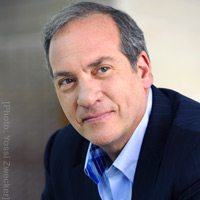|
Rabbi’s Commentary Depending on HimOct 07, 2015 
Dear Friend of The Fellowship, The ongoing crisis in Syria has now gone global, as millions of innocent civilians flee the country in search of safety. In addition to those killed or injured by the use of chemical and conventional weapons, nearly 7.6 million Syrians have been displaced from their homes and millions more have fled the country, staying within the neighbouring regions – Turkey, Lebanon, Jordan, and Iraq. Many are also seeking safety in Europe and North America. All of the Syrians who have been displaced are dealing with limited resources, inadequate housing and medical care, and the trauma of a bitter civil war. I look at the pictures of these refugees, many fleeing with just the clothing on their backs, and my heart breaks. We in Israel feel a heightened compassion for these displaced Syrians, not just because they are our neighbours, but also because we are a nation of refugees. The Jewish state was largely built by people fleeing for their lives, running from the horrors of the Holocaust, desperately searching for a safe place to call home. Even today, Israel regularly welcomes new arrivals with few possessions who have fled the anti-Semitism that is rampant in their homelands. In fact, the Israelites have a long history of being displaced – from the time God told Abraham to leave the familiar comfort of Ur and go to a land that He would show him, to the Exodus of the entire nation from years of harsh slavery in Egypt. It is this displacement that we remember on the Jewish holiday of Sukkot, also known as the Feast of Tabernacles, which began earlier last week and ended this past Sunday. In the Bible we are instructed to build temporary structures, called sukkot (the singular form of the word is sukkah), and then to eat, socialize, and even sleep in them throughout the duration of the eight-day holiday. These temporary structures are meant to remind us of the shelters the Israelites lived in during their sojourn in the desert. The biblical description of the Jews wandering in the desert tells us that, “By day the LORD went ahead of them in a pillar of cloud to guide them on their way and by night in a pillar of fire to give them light…” (Exodus 13:21). Jewish tradition usually refers to the cloud pillar as “the Clouds of Glory,” referencing the divine presence and protection they evidenced. This terminology hints at the deeper meaning of Sukkot: Ultimately, our protection and our sustenance come from God and our complete trust in Him. We build and dwell in these structures as an act of spiritual obedience and physical remembrance. It is so easy for those of us living in our modern world of numerous comforts and conveniences to think that we create our own security that we rely solely on our own strength and abilities. But this holiday and these temporary dwellings remind us that we are utterly dependent on God for our every need. This week let us all remember the rich lesson of Sukkot. And let us pray fervently that God will provide for and protect the millions of Syrians fleeing for their lives – and bless us all with His most precious gift of shalom, peace. Rabbi Yechiel Eckstein
|
|
|
Success! You should receive an email confirming that you have been signed up to receive emails from The Fellowship shortly.
Newsletter Signup
Success!
You should receive an email confirming that you have been signed up to receive emails from The Fellowship shortly.
Login
Error
Account Created
Success!
Your new username has been emailed to you.
It may take a few minutes to receive this email.
You have been logged in.



